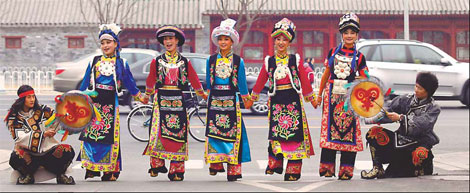Dancing to their own tune
Without a written language, the Qiang mainly pass on their culture orally. He is the only person in his home village who knows the many traditional folk songs and the procedures of rituals.
"With the changing of social environment, Qiang culture has been declining since the second half of the 20th century, but this seems to be inevitable in the process of modernization," says Wang Mingke, a research fellow with Academia Sinica of Taiwan, who specializes in the study of the Qiang people.
Wang, who has been to Sichuan more than 20 times since 1994 to do field research among the Qiang people and has published several books on the ethnic group, says the decline of Qiang culture has accelerated since the 1990s.
Shibi, or masters of religious ceremonies, are the most knowledgeable people in terms of traditional Qiang culture. Some shibi died in the earthquake and those that remain are all very old.
 |
|
Lacking a written language, the Qiang, found mostly in western Sichuan, mainly pass on their culture orally. |
In 2009, the Qiang New Year festival was put on the List of Intangible Cultural Heritage in Need of Urgent Safeguarding, by UNESCO, because "participation in the festival has declined in recent years due to migration, declining interest in Qiang heritage among the young and the impact of outside cultures, but the 2008 Sichuan earthquake that destroyed many of the Qiang villages and devastated the region put the New Year festival at grave risk".
In response, in July 2008, an on-line museum about Qiang culture (http: //www.qiang.ihchina.cn) was launched by China Intangible Cultural Heritage Preservation Center. In September 2008, A Reader of Qiang Culture for Students was compiled by a group of experts and released by the Zhonghua Book Company. In May last year, a four-volume Collection of the Qiang Oral Heritage was published.
The central government has ratified a budget of 702 million yuan ($102.8 million) for the reconstruction of culture and sports in Maoxian, where a "Qiang Town" is being built, including a museum, culture center and Training Center for Intangible Cultural Heritage.
"We tried to promote Qiang culture in the past, but as a poverty-stricken county, we were unable to do much," says Gao. "Now with support from the central government and various social sectors, we have a precious opportunity."
In the new "Qiang Town", locals will get jobs performing Qiang folk art and crafts like embroidery and silverware making. Soul of Qiang, which employs more than 100 farmer-turned performers, will also be staged in a 1,500-seat theater every night.
According to Gao, tourism will generate at least one third of the county's revenue in the future. Located half way on the road from Sichuan's capital city Chengdu, to Jiuzhaigou National Park, Maoxian is trying to attract more tourists to stay longer.
Wang cautions, however, that the development of tourism will only benefit some local people and have a limited impact in terms of saving Qiang culture. He suggests that apart from selling local products and catering to tourists, Qiang people can contribute more to the nation.
Wang says the Qiang live in a geologically unstable area near the upper reaches of the Yangtze and Yellow rivers that is vital for the environment of China.
"Using their traditional knowledge of the local biology, the Qiang can play an important role in China's environmental protection. I hope the central government will allocate funds to let Qiang people take the work of guarding western Sichuan's forests."
 0
0 







Go to Forum >>0 Comments